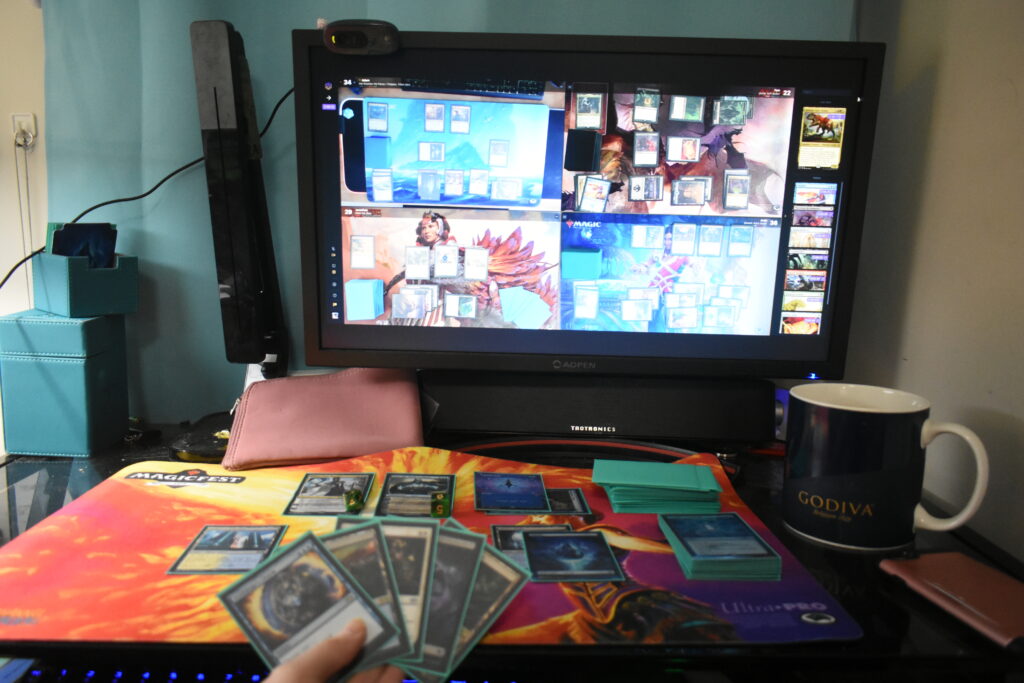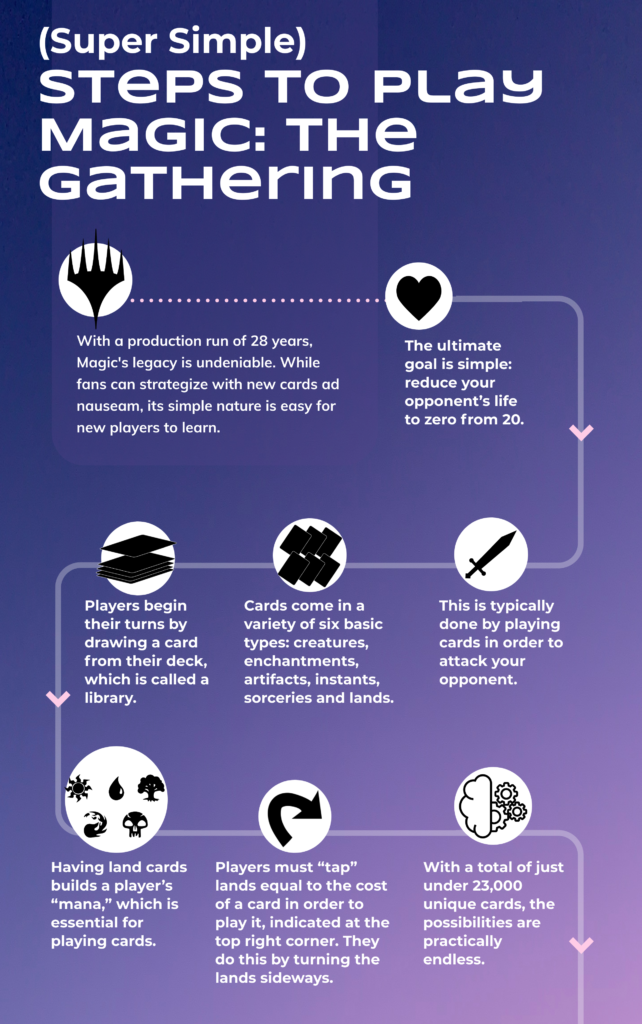
The elemental creature moves in to attack, fire spreading through billowing clouds of black smoke.
Suddenly a field of lightning erupts from the walls, stopping the creature in its tracks, but failing to slow down a skeletal soldier who breaks through. Its tattered armour clinks off of its dry bones as it runs forward. Lifting up its longsword, it strikes it down with a powerful slash.
“I think I’m dead,” one of the players says casually, collecting their cards and reshuffling them for the next round.
While some online games require a mouse and keyboard, this one only requires a webcam, trading cards and some imagination.
The Goat Magic Association is a group of Toronto students with an affinity for Magic: The Gathering, a trading card game that has players facing each other in a game of strategy. The ultimate goal is simple: reduce your opponent’s life to zero using a deck of cards — called a library — containing an array of spells ranging from creatures to enchantments and beyond.
In the years before the pandemic, games like these would be played on campus, typically once a week after class.
“One of the things that really resonates with me personally for Magic is … the community,” said Calvin Szeto, the group’s founder. “Getting to play the game is always fun, but meeting people who like to play the game for different reasons is one of the major things for myself.”
Szeto founded the group during the beginning of his final year at Ryerson in 2019 as a way for students to talk about their passion for the game and play together.
The goat name was chosen as a nod to the “satanic panic” of the late ’80s and early ’90s, when mass hysteria surrounding satanic ritualism took hold of the public in some parts of North America. It didn’t matter whether someone was a seasoned veteran or a complete newcomer; in some cases, you didn’t even need your own cards.
“Calvin stepped up really big because he has a huge [card] collection. So even if you didn’t own any cards yourself, you could come anyways and play one of his decks and still have fun with everybody,” says Sunny Yang, who’s been a member since his first year in 2019, just as the group was beginning.
Yang was at a Campus Services and Involvement Fair when he met Szeto, who at the time was helping run a tabletop role-playing game campus group. The two started talking, and when the topic turned to Magic, Szeto extended an invite to Yang.
While it’s never become an official school-affiliated group, Szeto has been able to foster a small community of around 65 like-minded gamers mostly through word of mouth. These days, the group’s primary meeting place is in the Goat Magic Association server on the popular Discord messaging platform and while not every user is active, the group sees new members joining almost every week.

Magic is a game that may go unnoticed by people who aren’t heavily involved in the gaming community, but its legacy is arguably monumental. With a production run of just under 23,000 unique cards, it’s managed to remain a bestseller for 28 years — and it isn’t slowing down.
According to an article from Forbes, Magic: The Gathering’s parent company, Hasbro, revealed that the card game had its best financial year in 2020.
“I think Magic has probably been the standard for a little while,” said Quinn Mantynen, an employee at Meeplemart, a game store at 247 Spadina Ave. “There are newcomers that take the throne a little bit … but none of them really last as long as Magic has, as far as the popularity goes.”
Mantynen says that, while some local game stores use Magic as their cash cow, Meeple Mart’s inventory is broader; the store carries a dizzying number of board games and tabletop games like Warhammer 40,000, alongside different card games like Pokémon and Yu-Gu-Oh!. Despite this, Magic still manages to remain a regular seller.
Part of Magic’s lasting success is the result of an inviting community of diehard fans, with new players discovering the game all the time. Ask any Magic fan and they’ll likely tell you they were happily taught how to play by friends or even complete strangers.
It’s this spirit that Szeto hopes to capture with the Goat Magic Association, although the pandemic has made this difficult. While games used to happen fairly regularly when students could meet in person, they’ve become more sporadic with the move online.
Programs like SpellTable — an online game client where players point a webcam at their cards in hopes of replicating the feel of in-person play — have helped, but it’s not a direct replacement for some.
“There is something very magical, so to speak, about sitting across from somebody and having physical paper cards in your hand and playing them and going through the motions,” said first-year student Matteo Khawaja, who got his first taste of the game in the seventh grade.
Khawaja joined the group’s Discord server at the beginning of the semester after some of his friends told him about it. He hasn’t had a chance to play any games yet, but he’s already started helping other players seeking advice.
The last few years for the Goat Magic Association have been up and down, marked by a promising start and marred by an abrupt stop. Either way, Szeto is happy with what he’s been able to help foster.
“There’s always going to be that constant — I wouldn’t say battle or struggle, but that constant pull of just trying to bring more people in and really helping this community grow and flourish,” says Szeto. “I would say that in some ways, I am successful, but I’m still always continuing to try to push and advocate for more.”
David Warner was a copy editor and reporter with an interest in arts and life for On The Record in fall 2021.

